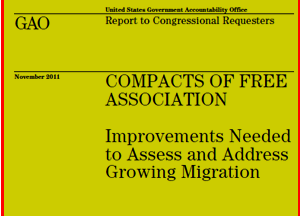The Government Accountability Office (GAO) has released a report which does not fully support Senator Daniel Inouye (D-Hawaii) overzealous efforts to curb legal migration of Pacific islanders from the freely associated states (FAS) to the U.S. Using the latest data from the U.S. Census Bureau and the American Community Survey (ACS), the report from the investigative arm of the U.S. Congress cited inaccuracies and other issues with which Hawaii and Guam have reported on the financial impact of the Compact on those governments. Per protocol, the GAO had solicited responses from the FSM government other affected jurisdictions. You can view the official response from the FSM Embassy in DC which is published in the GAO report along with comments from other jurisdictions including Guam, CNMI, Hawaii.
12 October 2011
David B Gootnick, PhD
Director
International Affairs & Trade
US Government Accountability Office
441 GStreet NW
Washington, DC 20548
Dear Dr Gootnick
The Government of the Federated States of Micronesia (FSM) expresses its sincere appreciation to the US Government Accountability Office for extending the invitation to comment on the draft report: “Compacts of Free Association – Improvements Needed to Assess and Address Growing Migration.” While the exercise is entirely an initiative of the US Government, we acknowledge its necessity as a tool in discerning and generating areas of possible improvement in our bilateral relationship pursuant to the Compact, as amended. Just as well, we recognize the hard work, diligence and professionalism that the GAO brought to bear on a multifaceted, complex and increasingly important subject, namely, the “impact” of the migrant populations of the Freely Associated States on the communities in which they reside in the US, particularly in the “affected jurisdictions” as defined by the Compact treaty.
Surely “Compact Impact” has taken on a new significance, and the migration of the FAS citizens to the US, including its territories and possessions, appears to be the leading contributor to placing the subject on the radar screen. It is precisely for this reason that we have been looking forward to the GAO report, as it is our sincere desire to help addressing the Compact Impact resulting from the migration of our citizens to the US and to also seek ways of improving their welfare.
Without meaning to delve into history, the “habitual residence” provisions of the Compact are one element that gives the treaty its unique character and practical meaning – a tribute to the architects of the treaty on both sides who envisioned the Compact as not just a mere relationship but a special and profound partnership. Thus, it is our desire in collaboratively addressing the Compact migrant impact issue to ensure that the treaty continues to be mutually beneficial to both the US and the FSM and that the spirit of partnership remains intact as the cornerstone and beacon light of the relationship as a whole.
True, in the economic condition of the present, these are real hard times for both the FSM and the US. However, the need to approach the issue objectively and on factual basis in a collaborative manner should not be compromised.
All in all, the FSM Government has concerns on various parts of the draft GAO report. Amongst those concerns, we would like to highlight the following:
1) Inconclusiveness of Findings and Absence of Net Cost and Net Contribution
We concur fully with the underlying assumption of the GAO study, and of those who commissioned it, that hardcore “numbers” or data are critical to gaining a fairly accurate picture of the impact of the FAS migrant populations in the US. To be credible, any measure aimed at addressing the adverse impacts of the “habitual residence” provisions of the amended Compact must be based on solid data. It is also highly desirable to present a comprehensive picture of the situation, showing both the net costs of services extended to the FAS migrants on the one hand and, on the other, the wide range of the migrants’ contributions to the communities where they reside.
The inconclusiveness of the findings of the GAO report is thus one of our main concerns. Our reading is that, despite its hard work and due diligence, the GAO is simply not in a position to provide a comprehensive picture as to the overall cost of the medical, educational, and other social services extended to the Compact migrants and the net contributions that they make to their communities. In other words, based on the GAO study, it cannot be said with maximum certainty that the FSM migrant population are a positive contributions to their respective communities; nor can it be said with full confidence that the Compact migrants are, on the whole, “free riders” on the social service systems of the communities where they reside. The statistics, the GAO report tells us, are simply not available or are not adequate.
But the inadequacy of solid data is not a good justification not to collaboratively confront the issue. It is for this reason that we take note of the GAO’s identification of measures that are necessary to facilitate or provide objective bases of addressing the issue of Compact migration in the affected jurisdictions. We are indeed pinning high hopes on the recommendations outlined in the report.
2) Impact of Application of Different Measurements
We appreciate the GAO draft report’s treatment of the different approaches that the US Government applied in trying to show the “picture” of our migrant populations in terms of both impact and characteristics. Our concern is that the application of these different approaches in different affected areas at different times yields numbers that cannot be easily used, if at all, for comparative purposes. The numbers as derived from the different approaches are less useful, if not misleading, in presenting an accurate picture ofthe scope ofthe Compact migration impact.
We are just as concerned that this “impact” of past disagreement in the selection of approaches to use may continue when the 2013 census is carried out. It is our hope – request rather — that those who are parties to, or will be involved in, the conduct of the census in 2013 hammer out an agreement on the best approach.
3) Inconsistency in the Definition of Compact “Migrant”
The question as to what constitutes a “Compact migrant” is critical to gaining a clear and accurate picture and scope of the migrant impact issue. It is very important that “Compact migrant” be clearly defined, or we will run the risks of miscounting the numbers and inaccurately describing the impact. One particular area of concern is with the FSM citizens who had arrived in the US prior to the entry into force of the Compact and who might be counted as “Compact migrants” but who should not be.
Another concern is with those who were born in the US, hence acquiring US citizenship as well,might be counted as “Compact migrants” for purpose of adding up the costs of medical, educational, and other social services and, on the other hand, listed as “US citizens” where their contributions would not be counted. As earlier noted, this ambiguity, if not inconsistency, in the definition of a Compact migrant is apt to yield not only inaccurate head-count of Compact migrants but misleading calculation or estimation of cost of services.
4) Exclusion of Citizens in the US Armed Forces
The security and defense agreement between the FSM and US is another significant element of the Compact relationship that we believe is not only mutually beneficial but which has brought hundreds of FSM citizens to the United States or to serve in the Armed Services of the United States.
We believe that our citizens in the US military constitute a significant portion of our Compact migrant population. To present the “whole picture” of the FSM migrant population in the US, we insist that our citizens in the US military be included in the head count and the calculation of their contributions. Their exclusion from the count, we believe, would not tell the whole story.
5) Medicaid Deductions and Ineligibility for Benefits
Our understanding from the draft report is that the costs of providing healthcare constitute the second largest expenditures for the affected jurisdictions on the FSM “migrant” population. To provide a solid basis of addressing this particular issue, it is to be wondered whether the aggregate amount of expenditures by the affected juristictions includes costs for those who came to the US before the implementation of the Compact and those who were born in the US after the entry into force of the treaty, hence are US citizens as well.
We also note with particular concern the finding that the FSM citizens working in the US pay into the Medicaid program, yet they do not receive benefits. This is an area of significant concern because it appears to raise an issue of fairness, if not indeed a legal question.
6) Possibility of Multiple-Counting in Expenditures
Subject to correction, it is our understanding that the affected areas receive certain federal funding for health, low-income housing and other social services — in addition to the $30 million that is appropriated annually for the Compact Impact Fund. What is not clear to us is whether the cumulative amount that each of the affected jurisdictions claims to spend on the FSM migrants includes payments from local sources of funding, the Compact Impact Fund, and federal funding.
It would seem reasonable and appropriate that the sources of payment for the cost of extending medical, school, and other social services for the FSM migrants be clearly delineated. The interest here is to avoid the possibility of multiple-counting of expenditures.
* * *
In closing, we would like to reiterate our gratitude for the opportunity to provide our concerns regarding the draft GAO report. We do so in the sincerest desire to work collaboratively to address the Compact migrant issue and, in the end, to sustain the mutual benefits of the Compact and its spirit of partnership.
[signed]
James A Naich
Charge de Affaires, ad interim
(Deputy Chief of Mission)
Embassy of the Federated States of Micronesia







